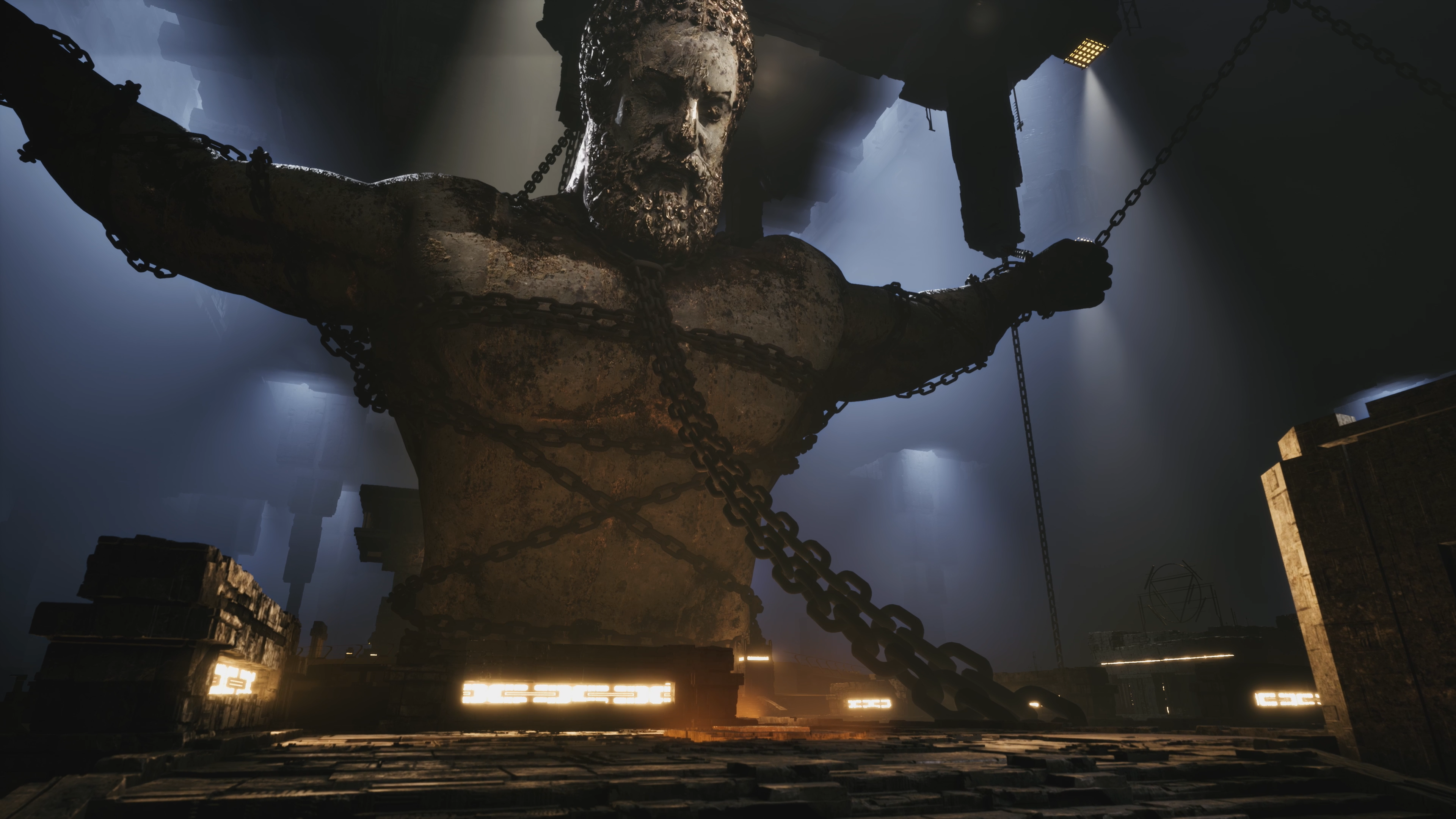When The Talos Principle was released in 2014, it received critical acclaim across the board from both critics and consumers, who praised it for not only its puzzles but also its story, told via narration and hidden collectible letters and audio logs from the past. But it wasn’t just its puzzles that tested players; The Talos Principle also bent the mind by asking questions about the nature of humanity and what it means to be a sentient being. Now, The Talos Principle 2 is setting out to continue asking thoughtful questions when it releases later this year.
We were lucky enough to be provided an extended preview of The Talos Principle 2, and had a chat with its fantastic writers: Jonas and Verena Kyratzes, who were able to give us some extra context to what we played that makes us even more excited to play the full game.
It’s obvious right from the word go that the Talos Principle 2 has evolved a lot from the first game. You awake as a robotic human in a society built of other robotic humans, using the ruins and scraps left behind by the extinct biological humans. When a mysterious apparition worries the leaders of the new society, you are recruited into an expedition to explore some nearby islands that seem to be powered by – you guessed it – puzzles.
Funnily enough, the Kyrates’ are no great fans of puzzle games. Despite this, Jonas recalls that when he was employed by Croteam midway through The Talos Principle’s development, he was impressed that its puzzles were not just arbitrary time-wasters but a fundamental part of the narrative. Since the puzzles had already been implemented, Jonas had to weave the narrative in between them, which is how the game arrived at the somewhat segmented story broken up between puzzle areas. He says that in contrast, The Talos Principle 2 has greatly benefited from having himself and Verena making contributions from the very start of development, even including the puzzle creation stage. As it turns out, there were many opportunities to implement some narrative moments within the puzzles themselves, such as the characters reacting to what they find inside some puzzle areas.

I don’t know if it’s because I’m already familiar with the basic concept of Talos Principle puzzles or if the new mechanics really are better conveyed, but I had a much easier time getting my head around the new puzzle elements introduced in the demo. Make no mistake, they are still difficult! I left behind my fair share of puzzles to try again later, but I found myself carrying less frustration than I did playing TP1.
Once again, the puzzles revolve around creating conduits of lasers to activate wall switches, but TP2 doesn’t waste time introducing old concepts. After a quick reminder about the puzzle elements from the last game, it’s full speed ahead with the new stuff. Some of the new elements I saw were various methods of changing the colours of the lasers, and portals. The demo gave me access to only 2 areas, and Jonas assured me that there were even more new elements I had yet to see.

In what is perhaps the biggest departure from the first game, you don’t get stuck into the puzzles right away. The game has expanded its narrative chops with actual dialogue with multiple characters and the opportunity to explore the city the new humans have built before embarking on the main quest.
I spent the first hour or so of the extended demo just engaging in dialogue with a lot of the characters you can find in the beginning area; although I liked that much of the exploration and dialogue is optional. You can be as interested or disinterested in the events around you as you wish, and the game will proceed without judgment.
Waxing philosophical with the writers
The main brainteaser from the first game was, “Can a machine be human? Can a human be a machine?” for which the game’s ending hypothesis was yes. I can already guess what philosophical questions The Talos Principle 2 will be gearing up to ask, but I asked the lead writer Jonas how he would put it in his own words. With multiple characters in the game anxiously trying to figure out what the future holds for their budding robot society, Jonas says The Talos Principle 2 now strives to ask, “What does society owe us?”
It’s a question Jonas calls”provocative”, but it’s easy to see why. that is far closer to our own society’s current worries than one about the nature of sentient AI, but that’s exactly why Jonas wants to encourage players to mull it over. “Fiction makes hard things easier to think about,” he explained. “Using sci-fi, we can de-mystify aspects of ourselves like consciousness. If AI is possible, then maybe we’re not unique, maybe we have no souls, maybe there is no God. In real life, these questions create anxiety and are perceived as threatening. but The Talos Principle 2 says they don’t have to be.”
Seeing just how much more playtime in Talos Principle 2 is dedicated to pure narrative compared to the first game, I asked the Kyratzes’ how much of TP2’s story was already planned for during the first game, if any. They replied that they always knew exactly where the story was going to head next, and there are some pieces of writing in the first game that lays out some foreshadowing for the events of 2.
In fact, Jonas says player reactions to The Talos Principle 1 provided some interesting insight into how closely some players pay attention to small details. Jonas explained how over the years has met players who paid tremendous attention to the story in ways he didn’t expect. Across the areas available in the demo, I found multiple optional puzzles that weren’t required to progress, but Jonas recommends completing them all if you want to gain a bigger understanding of the world. There is apparently even some more foreshadowing about a Talos Principle 3 (no official announcement though…)!

Unlike Jonas and Verena Kyratzes, I very much love puzzle games, but like them, I simply love narrative more. For that reason, I am more excited by The Talos Principle 2 than I was for the original. It seems to promise
The Talos Principle 2 will be released on 3 November 2023 on PlayStation and Xbox consoles, as well as PC.





